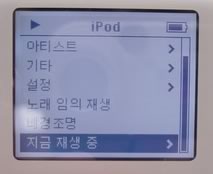iPod's South Korean iDilemma

In the United States and indeed most of the First World, Apple's iPod and iTunes Music Store enjoy clear market dominance, with more than 3/4 of music players sold bearing an Apple logo.
Yet South Korea is unique in its indefatigable resistance to the iPod. While the iPod holds 80% of the United States market, its share of the South Korean market is a scant 1.8%. Why this incredible disparity?
The simplest explanation is that the iPod simply isn't bleeding-edge enough for the South Koreans who are always at the absolute forefront of technology. However, the fact that the iPod holds 60% market share in Japan--a country certainly no less obsessed with state-of-the-art technology than South Korea--makes it clear that something less immediately apparent is at work here.
So what unique characteristic of South Korean society has made it immune to iPod mania?
-John Kneeland

5 Comments:
Perhaps this is a function of the nationalistic pride that we talked about in the last class. In the electronics market, there are many strong Korean competitors (Cowon, Samsung, and LG immediately come to mind). Maybe Koreans prefer to "buy Korean" instead of dropping the cash on an iPod.
I thought that a simpler explanation would have been the difference in MSRP, but apparently I'm wrong - a 30GB iPod retails at 350,000 won, while the Cowon iAudio X5 30GB goes for 439,000 won.
One thing I've noticed on my iPod is that it sometimes doesn't handle Asian language text very well - Thai doesn't show up at all. This may be another explanation.
--Sze Hui
I definitely think there are some nationalistic forces at play here. While most Koreans seem to love American goods (my relatives are prime examples!), in certain industries they seem to want to support the Korean brands. I think electronics is one area-- they believe Korean electronic brands are as good as, if not better than, other nations' brands.
A more practical explanation may be that Apple itself is not big in Korea- Korea is a PC nation. When I went to Korean department stores, almost none carried Apple computers. While the iPod works on the PC, Koreans may equate the iPod solely with Apple and believe that it is incompatible with their current systems.
-Lucie
I have both iPod and Iriver, and I should say that iPod is not popular in Korea because it is not good enough. While I think that there certainly is a factor of "national pride" playing in this, I have to mention Korean brand IRIVER. Iriver is the most leading Korean mp3 player brand in Korea, and it has far better functions than iPod. Iriver has voice recording function, works like USB memory stick, and many more.
--Jihyun Kim
I think it's more complicated than just being "better." There are plenty of mp3 players that are "better" (assuming of course that "better" is synonymous with "more features unrelated to being an mp3 player") than the iPod available in American and Japanese markets and the iPod still reigns supreme.
Americans place a premium on simplicity and " it just works" ease of use, and Japanese place a premium on minimalist aesthetic perfection. In both of these categories, the iPod is the unquestioned champion.
Koreans, it would seem, want everything but the kitchen sink in their mp3 players (and probably want that too).
-John Kneeland
Another factor may be the lack of the iTunes Music Store in Korea. One of the biggest draws to the iPod here in the US and in Japan is that the iPod provides a complete end-to-end music solution: the iPod itself for tunes on the go, iTunes software for managing your music library, and the iTunes store for the acquisition of new music. Granted, the iPod was a smash hit here in the US before iTMS was released, but it's certainly helped to fuel the hype here.
John, another thing I just thought of: the last time I went to Hong Kong to visit my relatives, my aunt made a comment about how big (in terms of dimensions) my 10GB iPod was. Riding the subway in Hong Kong, I noticed that flash-based MP3 players were much more popular, and perhaps that preference is shared in Korea as well. If this is the case, Apple's comparatively late entry into the flash MP3 player market (and consequently the associated perception that Apple makes only hard drive based players) may explain their lower share in Korea.
--Sze Hui
Post a Comment
<< Home